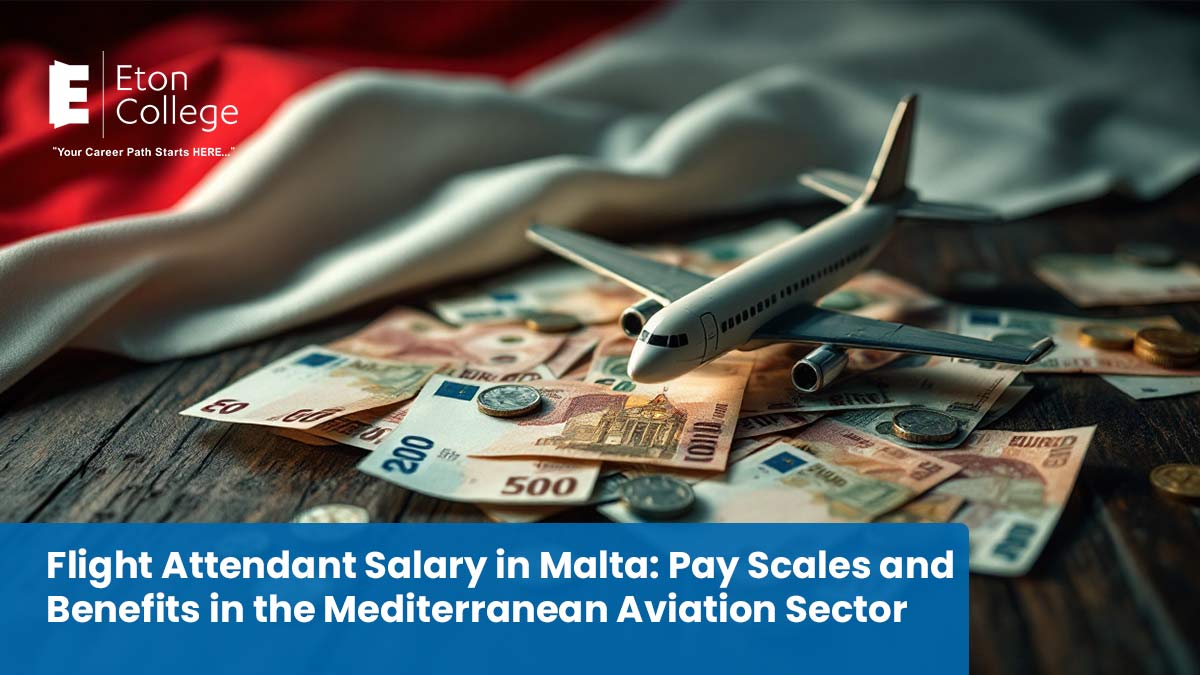- Flight attendants in Malta earn an average salary of €35,564 annually or €17 per hour.
- Average bonuses of €946 per year and shift differentials (e.g., extra pay for night shifts) can significantly increase earnings.
- While most flight attendants in Malta have a high school diploma, additional education (e.g., associate or bachelor’s degrees) can boost earning potential.
The Mediterranean aviation industry offers a unique career path for aspiring flight attendants, combining a vibrant work environment with the allure of traveling across stunning destinations. For those considering a career in the skies over Malta and beyond, understanding the expected flight attendant salary and job benefits can help shape expectations and guide career planning.
Average Flight Attendant Salary in Malta
As of recent industry data, the average flight attendant salary in Malta is approximately €35,564 per year, which breaks down to about €17 per hour. This average salary covers a range that can vary based on experience, location, and the type of airline. For example, entry-level flight attendants may start closer to €20,000 annually, while senior or highly experienced attendants might reach upwards of €40,000.
Additionally, flight attendants in Malta typically receive an annual bonus averaging €946. While not guaranteed, this bonus adds to the overall compensation, rewarding attendants for exceptional service, performance, or length of service.
Influencing Factors on Salary
Several factors can impact a flight attendant’s salary in Malta, making it a role where earnings can differ widely depending on individual circumstances. Key factors include:
- Experience: New hires generally start at entry-level salaries, but with more experience, they can see substantial increases in earnings.
- Shift Differentials: Working on nights, weekends, or public holidays can lead to additional earnings through shift differentials. In Malta, a shift differential of about 10% could add €1.71 per hour to a flight attendant’s base salary.
- Routes and Airline Types: International flights or long-haul routes tend to offer higher salaries due to the additional time and effort required. Airlines based in larger cities or serving international hubs may also offer better compensation compared to smaller, regional airlines.
Educational Background and Skills Required
In Malta, a high school diploma is typically the minimum educational requirement for flight attendants, with 52% of professionals in this role having completed high school. However, additional education can positively impact earning potential, as 22% of attendants hold a bachelor’s degree and 14% have an associate degree.
Key skills valued by Maltese airlines include:
- Customer Service: Strong interpersonal skills are essential for creating positive passenger experiences.
- Emergency Preparedness: Flight attendants must handle emergency situations calmly, ensuring the safety of passengers and crew.
- Flexibility and Adaptability: Working in different time zones and irregular hours requires adaptability and a willingness to handle various situations.
Language proficiency, especially in English and Maltese, is also highly valued, as it allows attendants to effectively communicate with both local and international passengers. Multilingual skills can provide an added advantage, particularly in airlines servicing multiple European or North African destinations.
Job Benefits for Flight Attendants in Malta
Flight attendants in Malta enjoy a range of benefits in addition to their base salary, making the role particularly attractive to those passionate about travel and customer service. These benefits typically include:
- Healthcare and Insurance: Airlines often provide healthcare benefits, including medical, dental, and sometimes vision insurance.
- Travel Perks: One of the most celebrated perks of being a flight attendant is discounted or even free flights for personal travel. Some airlines extend these benefits to family members, allowing attendants and their loved ones to explore destinations at minimal costs.
- Meal and Accommodation Allowances: Attendants frequently receive allowances for meals and accommodations when working international or overnight flights, adding to their overall earnings.
- Paid Training: Airlines often provide paid training for new hires, covering essential skills in safety, customer service, and first aid.
Industry Growth and Salary Potential in Malta
The aviation industry in Malta, like much of Europe, is expected to see growth in the coming years. An estimated salary increase of 9% is projected by 2029, with the average salary expected to reach €38,882. This projected growth in earnings reflects the increased demand for skilled flight attendants as air travel continues to recover and expand across the Mediterranean and beyond.
Moreover, the rising demand for air travel means that new opportunities for flight attendants are expected to emerge, especially with airlines looking to expand their Mediterranean routes.
How Eton College Can Help You Achieve Your Flight Attendant Goals
Preparing to become a flight attendant in Malta’s competitive aviation sector requires more than just meeting the minimum qualifications. Comprehensive training in customer service, safety procedures, and emergency response can significantly enhance your employability. Eton College’s Flight Attendant Preparation Program is designed to provide students with the practical skills and confidence needed to excel in this industry.
The program covers essential topics, including:
- Customer Service Training: Develop the skills to create positive passenger experiences, a key aspect of the flight attendant role.
- Safety and Emergency Preparedness: Gain knowledge in safety procedures and first aid to handle various in-flight scenarios effectively.
- Communication Skills: Improve your ability to communicate clearly with passengers and crew, essential for a flight attendant’s success.
Eton College’s program not only meets industry standards but also provides insights into the realities of the profession, offering students an advantage when applying to airlines in Malta and beyond.
A career as a flight attendant in Malta is both financially rewarding and filled with opportunities for growth, especially for those equipped with the right skills and training. With an average salary of €35,564 and attractive benefits such as healthcare, travel discounts, and shift differentials, flight attendants in Malta enjoy a competitive compensation package. The industry’s projected growth further enhances job prospects, making it an exciting time to enter the field.
FAQs
- What is the average salary for a flight attendant in Malta?
The average flight attendant salary in Malta is approximately €35,564 per year or about €17 per hour. Experienced attendants may earn more, with entry-level salaries lower and senior attendants potentially reaching €40,000. - Do flight attendants in Malta receive bonuses?
Yes, flight attendants in Malta typically receive an average bonus of €946 annually, which adds to their total compensation. Additionally, shift differentials can increase hourly pay for night, weekend, or holiday shifts. - What benefits do flight attendants in Malta receive?
Aside from a competitive salary, flight attendants in Malta enjoy benefits such as healthcare, travel perks like discounted or free flights, accommodation allowances for overnight flights, and paid training. - How can Eton College’s Flight Attendant Preparation Program help me become a flight attendant?
Eton College’s program equips aspiring flight attendants with the essential skills and knowledge required in the industry. The program covers customer service training, safety protocols, and emergency preparedness to help students succeed in their aviation careers. - Is the flight attendant profession in Malta expected to grow?
Yes, the aviation sector in Malta is expected to grow, with salaries projected to increase by 9% over the next five years, reaching around €38,882 by 2029. This growth reflects a positive outlook for career opportunities in the field.




